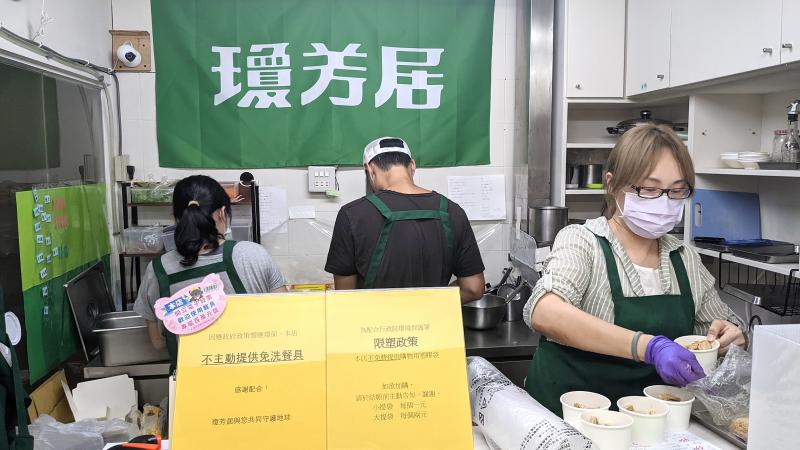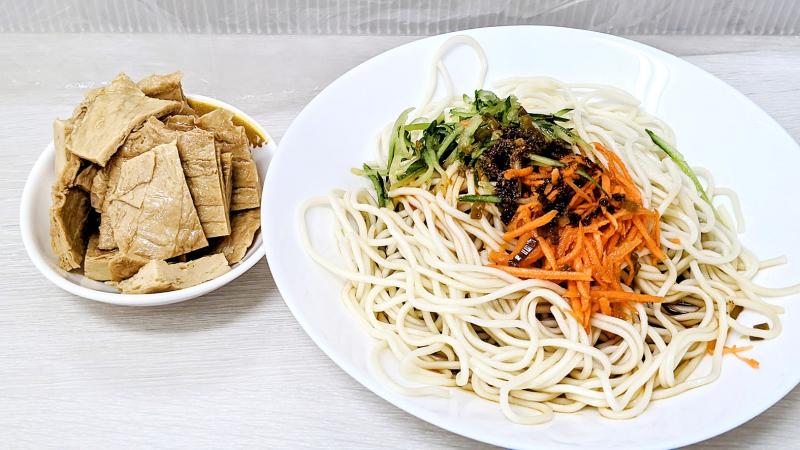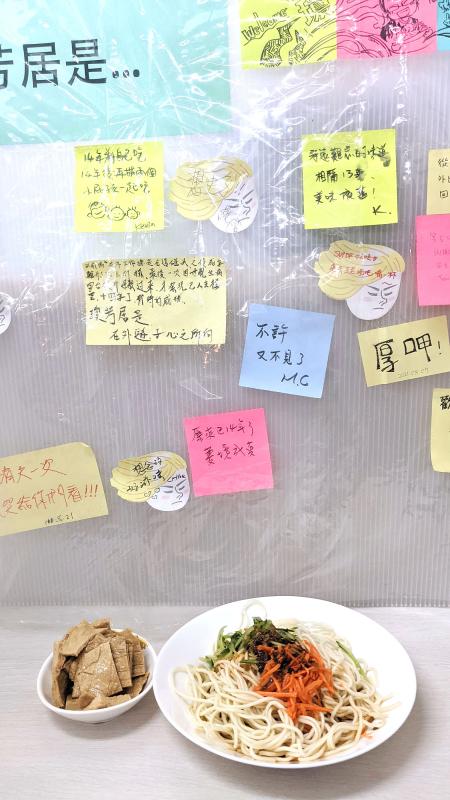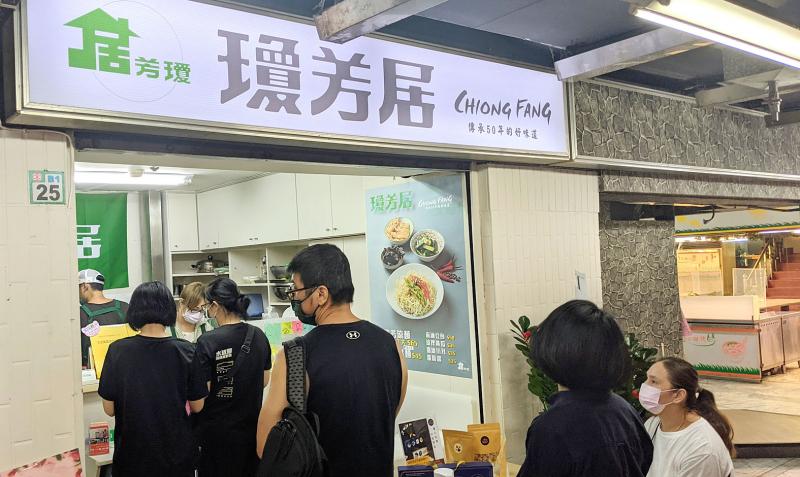I don’t think I’ve ever waited over an hour for any meal before — much less a bowl of NT$55 cold noodles in a dingy basement food court.
But as restaurants across the nation are shutting down due to COVID-19 restrictions, Chiong Fang’s (瓊芳居) staff have been overwhelmed to the point that they don’t have time to take bathroom breaks. It’s been this hectic since the tiny but legendary eatery in Ximending’s Wannian Building reopened in July after a 14-year hiatus.
As of last week, take-out is about an hour wait, while those who want to dine-in have to stand by even longer.

Photo: Han Cheung, Taipei Times
“Some people are getting mad at us for the waiting times, but what can we do?” a staffer tells me.
The Sichuan-style sour and spicy noodles are indeed pretty good, especially paired with the signature fried tofu skin marinated in a sweet sesame oil sauce still made by the shop’s founder, who is now in her 70s. The signature offering stands out among the innumerable cold noodle offerings in Taipei by eschewing sesame or peanut sauce for a simple mix of chili oil, vinegar, soy sauce, sugar and other spices.
But is it really worth the long wait? Well, if you grew up with it, I suppose. Nostalgia is the main draw here, and the staff assures me that everything tastes exactly as it did 14 years ago. This claim may be verified from the sticky notes plastered on the counter facing the tiny shop’s single indoor dining seat.

Photo: Han Cheung, Taipei Times
“If you disappear again, I’m going to cry!” reads one.
“I cannot believe that it has been 14 years. This is like a dream come true!” proclaims another.
“I used to meet my mother here when she was still working. My career took me overseas, but I later returned because my mother fell ill. We wanted to eat here, but discovered that it had closed down. It’s been 14 years, but it feels like it was yesterday.”

Photo: Han Cheung, Taipei Times
Apparently even the Taipei Times was a fan, as Chiong Fang (transliterated as Qiong Fang Ju then, before it got an official English name) was named among the paper’s top 10 restaurants of 2004. Fewer than half of that list are still around.
The noodles are very refreshing on a hot day, its complex but light flavor profile falling on the sour side with a nice spicy kick. The spiciness can be adjusted to taste. They go especially well with the sweet and juicy tofu skin, whose earthy, sesame-tinged essence complements the noodles well.
The noodle shop was born in the 1960s when the owner, a native of Zizhong County in China’s Sichuan Province, dreamt of the winning “secret sauce” that eventually earned her shop a loyal following. It moved to the Wannian Building when the shopping center opened in 1973. In 2007, the owner took a short break to deal with family matters, but she soon got sick and the shop remained shuttered.

Photo: Han Cheung, Taipei Times
The “we will be closed for a few weeks” note remained on the window for years, listing a phone number that was disconnected. With the store’s main sign still in place, Chiong Fang became an urban legend among Ximending’s youngsters who had only heard about how delicious the noodles were. Discussions about it would show up on online bulletin board system Professional Technology Temple (PTT) every once in a while — for instance in 2017 after popular YouTuber-turned-politician Froggy (呱吉, real name Chiu Wei-chieh, 邱威傑) called it the “tastiest cold noodles in human history in my opinion” in a video series on local cuisine.
“They never announced that they were closing, so for a long time, I stopped by every month to see if they had reopened,” Froggy says. “Eventually, I knew that my quest was hopeless, and I even stopped visiting Ximending.”
According to the staff, after the owner’s health greatly improved, she could only think of reopening the shop. They planned on returning last year, but things kept getting delayed due to the pandemic. They got tired of waiting and launched with level 3 COVID-19 restrictions still in place, hoping that the cases would soon go down. It didn’t matter that they were situated in the outbreak hotspot in Wanhua District (萬華) and only did takeout; people actually missed the noodles that much.
Many of the dishes Froggy reminisced of are no longer offered on the significantly reduced menu, which just includes cold noodles (NT$55 for small bowl, NT$65 for large), hot dry noodles (NT$45), bean curd skin (NT$50), two other side dishes and radish soup (NT$35 each).
I quickly finished my meal as there were still people waiting for that lone dine-in spot with 10 minutes until closing. I would definitely recommend trying these noodles, but if they don’t have any sentimental value to you, it’s better to wait a few weeks until the frenzy calms down.

April 14 to April 20 In March 1947, Sising Katadrepan urged the government to drop the “high mountain people” (高山族) designation for Indigenous Taiwanese and refer to them as “Taiwan people” (台灣族). He considered the term derogatory, arguing that it made them sound like animals. The Taiwan Provincial Government agreed to stop using the term, stating that Indigenous Taiwanese suffered all sorts of discrimination and oppression under the Japanese and were forced to live in the mountains as outsiders to society. Now, under the new regime, they would be seen as equals, thus they should be henceforth

Last week, the the National Immigration Agency (NIA) told the legislature that more than 10,000 naturalized Taiwanese citizens from the People’s Republic of China (PRC) risked having their citizenship revoked if they failed to provide proof that they had renounced their Chinese household registration within the next three months. Renunciation is required under the Act Governing Relations Between the People of the Taiwan Area and the Mainland Area (臺灣地區與大陸地區人民關係條例), as amended in 2004, though it was only a legal requirement after 2000. Prior to that, it had been only an administrative requirement since the Nationality Act (國籍法) was established in

With over 80 works on display, this is Louise Bourgeois’ first solo show in Taiwan. Visitors are invited to traverse her world of love and hate, vengeance and acceptance, trauma and reconciliation. Dominating the entrance, the nine-foot-tall Crouching Spider (2003) greets visitors. The creature looms behind the glass facade, symbolic protector and gatekeeper to the intimate journey ahead. Bourgeois, best known for her giant spider sculptures, is one of the most influential artist of the twentieth century. Blending vulnerability and defiance through themes of sexuality, trauma and identity, her work reshaped the landscape of contemporary art with fearless honesty. “People are influenced by

Three big changes have transformed the landscape of Taiwan’s local patronage factions: Increasing Democratic Progressive Party (DPP) involvement, rising new factions and the Chinese Nationalist Party’s (KMT) significantly weakened control. GREEN FACTIONS It is said that “south of the Zhuoshui River (濁水溪), there is no blue-green divide,” meaning that from Yunlin County south there is no difference between KMT and DPP politicians. This is not always true, but there is more than a grain of truth to it. Traditionally, DPP factions are viewed as national entities, with their primary function to secure plum positions in the party and government. This is not unusual